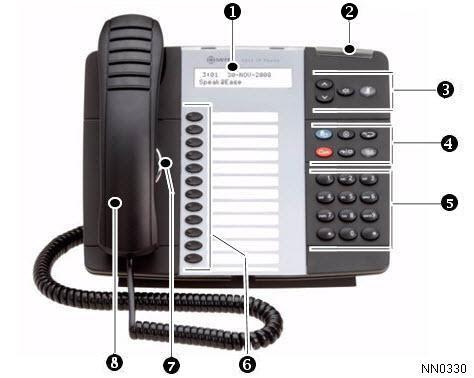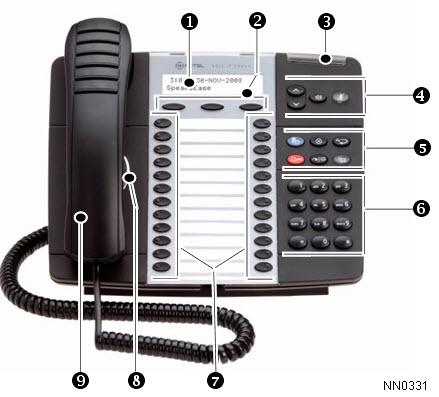About Your 5312 and 5324 IP Phone
The Mitel® 5312 and 5324 IP Phones are full-feature, dual port, dual mode telephones that provide voice communication over an IP network. Each features a back-lit liquid crystal display (LCD) screen, display-assisted access to features, on-hook dialing and off-hook voice announce with handsfree answerback, and a large ringing/message indicator. The 5312 IP Phone offers 12 programmable keys, and the 5324 IP Phone offers 24 programmable keys for one-touch feature access. Both phones provide ten fixed feature keys for convenient access to features such as Conferencing, Redial, and many customizable user settings.
The 5312 and 5324 IP Phones support Mitel Call Control (MiNet) protocol and Session Initiated Protocol (SIP). The 5324 IP Phone also supports modules such as the Line Interface Module, 5310 IP Conference Unit, and the 12 and 48 Button Programmable Key Modules. The 5324 IP Phone can be used as an ACD Agent Phone or a Teleworker phone. The personal key on the bottom left (5312) or bottom right (5324) is always your Prime Line; the remaining personal keys can be programmed as:
- Feature keys (for example, Do Not Disturb). You can program feature keys from your phone (5324 only), or using the Desktop Tool. Your administrator can also program feature keys.
- Speed Call keys. You can program speed call keys from your phone, or using the Desktop Tool.
- Line Appearances. Only the administrator can program line appearances.
| Note: For more information on the Desktop Tool, talk to your system administrator. |

5312 IP Phone

5324 IP Phone
Elements of Your Phone |
|
|---|---|
Feature | Function |
1) Display | Provides a two–line, 20–character liquid crystal display (LCD) viewing area that assists you in selecting and using phone features, accessing your voice mail, and identifying callers. When you access the Application key, prompts and feature information appear on the display screen. For information on selecting menu options, see "Selecting Menu Options" elsewhere in this guide. |
2) Softkeys (5324 IP Phone only) | Context-sensitive keys change depending on the modes of the operation and the menu currently displayed. Softkeys enable you to easily view and select a variety of features. |
3) Ring/Message Indicator | Flashes to signal an incoming call and to indicate a message waiting in your voice mailbox. |
4) Volume, Speaker and Mute Controls | Provide the following audio control capability: |
5) Fixed Function Keys | Give you access to the following phone functions: |
6) Keypad | Use to dial. |
7) Programmable Personal Keys and Designation Card | Provides 12 or 24 keys that can be programmed as speed call keys, feature keys, or line appearance keys, according to your communication needs. Personal keys have status indicators. On a 5324 IP Phone, the bottom right personal key is always your Prime Line key. On the 5312 IP Phone, the bottom left personal keys is always your Prime Line key. Write the name (speed call, feature or line appearance) of the Personal keys that you program on the designation card (use the side of the card with the textboxes provided). Use the slot behind the plastic cover at the bottom of the phone to remove/insert the designation card. |
8) Handsfree Speaker | Provides sound for Handsfree calls and background music. |
9) Handset | Use for handset calls. If you are in headset or handsfree mode, you do not need to use the handset. |
Ring/Message Indicators
When indicator is | it means that |
Flashing rapidly | Your phone is ringing |
Flashing slowly | A message or callback message is waiting at your phone |
On | Your phone is ringing another phone |
Off | Your phone is idle, or you are on a call |
Selecting Menu Options
Because the 5324 IP Phone offers softkeys, feature availability and menu options for the 5312 and 5324 IP Phones may differ.
To select menu items on the display:
- On a 5324 IP Phone, press the softkeys.
- On a 5312 IP Phone, press *, 0 and # on the keypad. For example, if options *=YES 0=DEFAULT #=NO appear and you want to select YES, press *.
Procedures in this guide show all menu selection options, where applicable—for example, "Press the * or Yes softkey". Procedures in this guide also specify when a menu option is available on only one of the phones—for example, "On a 5324 IP Phone only, press the Save softkey".
Using Your IP Phone with Mitel Unified Communicator Express
Unified Communicator Express is a lightweight (server-less) unified communications client that provides productivity enhancements like click to dial, incoming caller ID pop-up, PC-based missed calls and speed calls list, and personal (Microsoft® Outlook®) directory integration. In addition to enhancing telephony features in the office environment, it allows you to be immediately attentive to all incoming communications.
For more information on installing and using this application, see the Mitel Unified Communicator Express documentation available at http://edocs.mitel.com.
Using Your IP Phone in Remote Mode
Remote Mode allows the 5312 and 5324 IP Phone to be used as a Teleworker in the home or in other locations away from the office. For information on how to program your IP Phone for remote operation, refer to the Multi-protocol Border Gateway Remote IP Phone Configuration Guide available at http://edocs.mitel.com.
About Feature Access Codes
Use of some features requires dialing access codes. Ask your Administrator for a list of codes you should use.
For Users on Resilient Mitel Communications Director (MCD) Systems
If during a call, you hear two beeps repeated every 20 seconds it means that your phone is switching to a secondary MCD system. The call continues but some of the keys and features on your phone function differently. The keys and most features begin working normally again after you hang up. If your phone switches to the secondary system while your speaker or handset is muted (that is, while the ![]() MUTE light is on), the call remains muted until you hang up. Normal operation resumes when your phone switches back to the primary system. If your phone is idle and switched to the secondary system, you'll see a flashing rectangle on the display. The rectangle remains until the switch to the primary system is complete.
MUTE light is on), the call remains muted until you hang up. Normal operation resumes when your phone switches back to the primary system. If your phone is idle and switched to the secondary system, you'll see a flashing rectangle on the display. The rectangle remains until the switch to the primary system is complete.
Line Interface Module
The Line Interface Module is an optional device that adds an analog phone line (POTS) capability to your 5324 IP phone only. If Emergency Call Routing is not programmed on your MCD, you must use the Line Interface Module to dial emergency calls. For more information on emergency number dialing, refer to Emergency Calls. If you have a Line Interface Module connected to your 5324 IP Phone, all programming of the Line Interface Module, except the Analog Key, is done by the Installer when your phone is installed. For more information, refer to "Using the Line Interface Module" elsewhere in this guide.
| Note: The 5312 IP Phone does not support the Line Interface Module. |